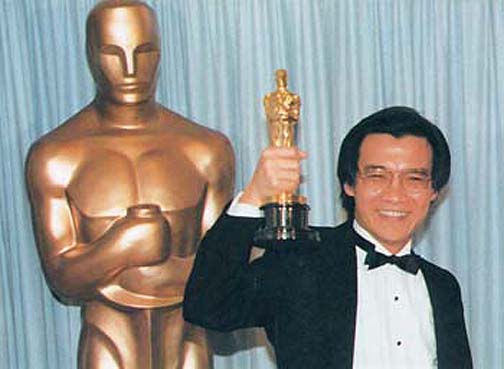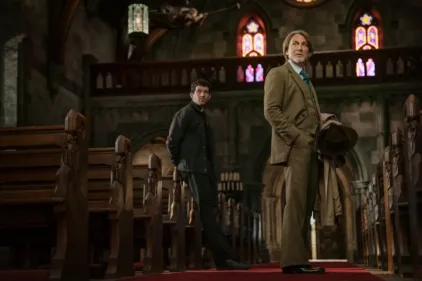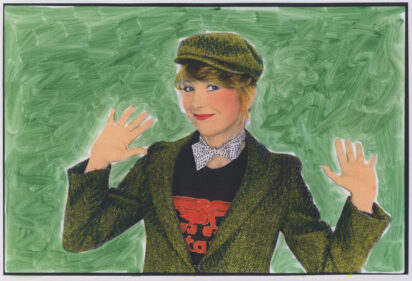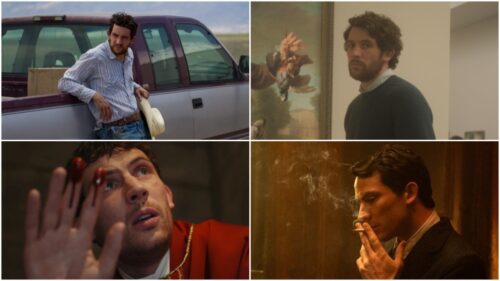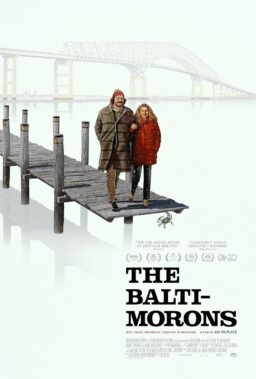Los Angeles, California — Early on the morning of the day that he would win the Academy Award, Dr. Haing S. Ngor found himself in the middle of the annual Oscar media circus. He was sitting in a director’s chair outside the Dorothy Chandler Pavilion, sipping tea under a gloomy sky, trying to ignore the fans in the nearby bleachers, who were chanting his name. He had already been in terviewed for TV stations in Boston and New York, and now he was going to do the “A.M. Los Angeles” program before being followed around all day by a crew from “Good Morning, America.”
If you stood to one side and watched him, and thought about the story of his life, you had to believe that miracles were possible. Here was a man who survived three terms in Cambodian prison camps. A doctor who used his knowledge of nutrition to keep himself alive by eating beetles, termites and scorpi ons. A man who weighed only 50 pounds six years ago, when he crawled between Khmer Rouge and Vietnamese lines to safety in a Red Cross refugee camp, and who now was calmly signing autographs and giving interviews and having his makeup checked before he went on the air.
The “AM” show was broadcast ing live from the plaza outside Chandler Pavilion. Haing Ngor walked onto the set to be interviewed by the co-hosts, Steve Ed wards and Cristina Ferrare. Ed Crane, the West Coast publicity manager for Warner Bros., stood behind the cameras and listened.
“His English has gotten a lot better just since last autumn,” Crane said. “Working with him has been unlike anything else I’ve ever done as a movie publicist. Haing is family. We eat together at least once a week. When he went to Europe to promote the re lease of ‘The Killing Fields,’ I had to raid the studio wardrobe to find him a topcoat. Of course, since then, Warners has given him two fairly nice checks, and he can afford to buy his own topcoats.”
In a town where casual is chic, Ngor was dressed this morning like a doctor. He was wearing a navy blue suit coat and vest, a striped tie, brown slacks. He held himself with a certain reserve; the extraordinary attention surrounding his perfor mance in “The Killing Fields” hasn’t turned him into a crowd pleaser. He is one of those natural noblemen who seem incapable of losing his dignity.
After he got off the air, Ngor signed a few autographs, always taking the time to find out the fan’s name and write a little per sonal message, and then Ed Crane steered him into a big stretch lim ousine with a bar and a TV set. They were off to the Tuxedo Cen ter on Sunset Strip, to be outfitted for the big night.
The “Good Morning America” crew was waiting in front of the store, ready to film Ngor getting out of the limo and walking inside. The camera followed him through the door, where, to everyone’s surprise, Adolph Caesar, one of Ngor’s competitors in the best supporting actor category, also was being fitted for a tux. Ngor was at a loss for words, but Caesar, an old television and stage pro, wrapped an arm around him and said, “Take my best wishes… take my deepest re spect… take everything except the Oscar.”
While Ngor was trying on tuxedo pants, Ed Crane was on the phone to the nearby Chateau Marmont Hotel, the Hollywood landmark where John Belushi died. “I need a nice, quiet suite for the GMA sit-down interview,” he explained. “I’m asking them to do me a favor and lend me one.” They did.
Ngor’s chauffeur carried his tux edo out to the car, and we drove down to the Chateau. In the back seat, Ngor slapped Crane on the shoulder and said, “This my step- daddy. He take good care of me.”
“Tell about all your fan mail,” Crane said.
Ngor grinned. “I get letter, phone call. I don’t know who give phone number to them. Girls calling up, lots of letters, girls want to meet me. Some send me their picture. Some people give me 20 dollars bill, to get autograph. Even hats, I auto graph. Is crazy.”
Haing Ngor has been trying to balance this public fame with his full-time job at the Chinatown Counseling Service, an agency that advises newly arrived Southeast Asians on resettlement in America.
“I try to find them job, find them place to live, tell them about welfare benefits,” he said.
“Sometimes the two worlds over lap,” Crane said. “Not long ago, we were out at the Bel Air Hotel, in the suite of Roland Joffe, who di rected ‘Killing Fields.’ Haing sud denly got very quiet and stood next to the door, listening. He said he could hear Cambodian being spoken. He opened the door, and there were two Cambodian maids that had been clients of his. He turned around and said, ‘I got them this job!’”
Have you had to take a leave of absence to deal with all the Oscar publicity? I asked.
“I take leave to go to Europe, three weeks. Also, I take off today,” Ngor said. “Mostly, I try to stay on job.”
That has resulted in Ngor’s co-existing in two worlds. One is the Los Angeles Cambodian community of some 50,000 people, settled in the Long Beach area, where he lives. The other, 30 miles away by expressway, is the world of Hollywood back lots, luncheon in terviews, Beverly Hills cocktail parties and TV studios. On the Saturday before the Oscars, for example, Ngor attended three parties: One given by the managing editors of Time and People magazines, one given by the executives of Warner Bros., and one given by his friends in Long Beach. He borrowed a studio limousine to visit his friends in between the other two events.
At the Chateau Marmont, ABC-TV reporter Cathy Lee Johnson was waiting for Ngor. The “GMA” cameras were set up in a big top floor suite overlooking Sunset Strip and a giant Marlboro Man billboard; Bogart and Bacall had once partied here.
Johnson asked Ngor how it felt to be nominated for the Oscar.
“I don’t understand what you mean, how it feels,” Ngor said. His English is fairly good, and he is quick at memorizing dialogue in English, but sometimes there is a context he doesn’t understand.
“She means, how do you feel,” Crane said.
“Nervous and exciting and happy and funny, too,” Ngor said.
After the “GMA” interview, we went to have lunch at Chan Dara, a Siamese restaurant near Hollywood Boulevard. Here, surprisingly, Ngor was not quite so much of a star, and had to wait for a table. None of the Asian employees asked for his autograph, perhaps because they were not in the habit of seeing Hollywood movies, even the ones starring Cambodians.
“I got up at six this morning, and my niece fix me breakfast,” Ngor said. “We had porridge and eggs, with dry shrimp in the eggs. Is my favorite dish.”
He supervised the orders for lunch, choosing beef with mint leaves in chili sauce, and a spicy soup.
“It sure beats scorpions,” Ed Crane said, and Ngor laughed. “That’s our standing joke,” Crane explained. “Every time we’re in some situation like flying first class to New York, I tell Ngor, it beats eating scorpions.”
How does that feel? I asked Ngor. Are there times when it sud denly strikes you, how different your life is today than six or seven years ago?
“Yes,” he said, and paused long enough that I thought that might be his entire answer. “Khmer Rouge kill my mother, father. My niece, kill her parents. My other niece, my sister’s daughter who I just discovered living in France, they kill her whole family. What saved me was Buddha, and my mother’s breast milk, which gave me courage. I hope with this movie, whole world will know the story of what happened. On June 2, 1978, my girlfriend died of starvation. She died in my hands.”
Do you someday hope to have children, to carry on the genera tions so that the Khmer Rouge will not have exterminated your family?
“Yes, have children, so next gen eration can deal with my country.” Do you have a girlfriend now?
“Just friend. Not girlfriend.”
The food arrived, and Ngor and Crane began talking about Ngor’s future acting career. There seem to be two approaches to the subject. Some movie industry people be lieve that Ngor is a (one-role phe nomenon, like Harold Russell, the handless veteran who won an Oscar in 1946 for “The Best Years of Our Lives.” Others, like his “Killing Fields” co-star John Malkovich, say that Ngor is a natural actor and can play anyone.
“The problem is, to find the right role,” Crane said. “He can’t do this movie and then do a guest shot on a TV sitcom. He can’t play Tom Selleck’s houseboy. You have to respect a certain plateau. There’s one role he’s looking at, for a TV mini-series named ‘Blood and Orchids,’ to be shot in Hawaii. He’d play a defense attorney. Also, there are rumors that Stanley Kubrick might use him in a Vietnam movie he’s preparing.”
Ngor grinned. “All directors a little crazy,” he said. “Roland Joffe, who made this movie, not tell me until I arrive on set in Thailand that I playing Dith Pran. I think, How big I am right now! Joffe thinking all the time. He don’t care about lunchtime, dinner. Whole crew called him Buddha, because he thinks so deeply.”
Some people say you were only playing yourself in the movie, I said.
“No problem for me to act. I act normally. I can do everything. If I speak English good enough, I can do anything. Maybe comedian. I take no acting in school, but I find out is something I can do. Gift from Buddha, and my mom, and daddy.”
The soup arrived, and Ngor took the ladle and served everyone at the table, insisting they take larger portions.
“Today, sometimes I miss normal life,” he said. “A lot of people recognize who I am. I can’t believe. Before, when I came to United States, no one take me a look. No one. I walk down a street, nobody even see me.”
“And now he’s bigger than Bruce Lee,” Ed Crane said.
Haing Ngor laughed. This was better than eating scorpions.

